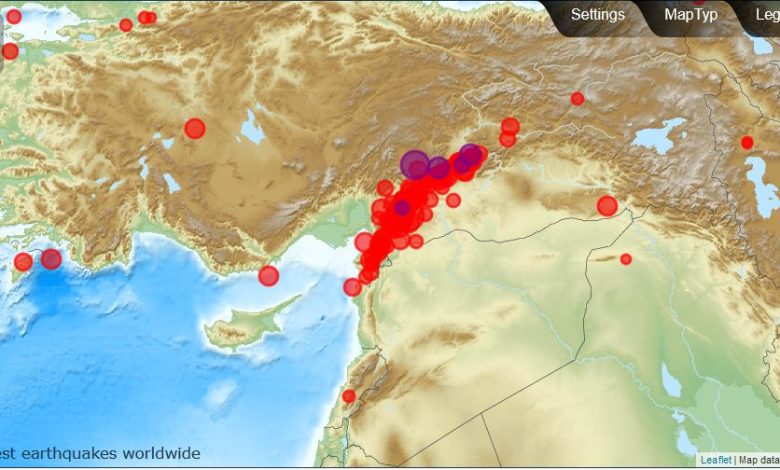In the middle of the night and just before dawn, when most people were still asleep, a devastating earthquake struck south-eastern Turkey and northern Syria. According to the Turkish civil protection agency AFAD, the epicenter of the most severe earthquake with a magnitude of 7.4 was in Pazarcik near Gaziantep, near the Syrian border. The AFAD later corrected the number to 7 7. The American earthquake institute discerned the magnitude to even have been 7.8. In the first hours after the earthquake, another 70 aftershocks were recorded, including another strong 6.6 magnitude tremor in Gaziantep, Turkey.
For Turkey and Syria, it is the most severe and lethal earthquake in their history. The magnitude of the earthquake is yet not clear, however, will likely bring out the worst fears in the coming days, according to the first images, videos, and reports.
By midday, Turkish President Recep Tayyip Erdogan reported 912 casualties and more than 5,000 wounded civilians in Turkey. Videos have been circulating on social media displaying desperate villagers trying to provide help as rescuers had not reached many areas, especially rural ones, by midday. Turkey is geographically located in an area with a high risk of earthquakes and, especially after the severe earthquake in İstanbul in 1999, has better prepared itself for such scenarios. Nevertheless, the earthquake hit Turkey hard.
While international attention is focused primarily on Turkey, the earthquake hit Syria equally, if not even more severely, than Turkey. Syria cannot respond to the earthquake by the same means as Turkey. There is a lack of capacity and coordination everywhere. In addition, the country is so shattered by the bloody civil war that joint action in the country is not possible. The information about the number of victims and damages varies. With multiple areas controlled and ruled by multiple parties in Syria, obtaining holistic numbers is difficult. The first provided information published about more than 350 casualties, however, these numbers should rise sharply in the next few days.
The call on Syrian State television that wherever there are excavators, people should use them for salvage, displays the scope of desperation in the country. Many buildings and residential complexes in the country were damaged in the civil war. These often-inhabited buildings were particularly at risk of collapsing in this earthquake. In Turkish-occupied Afrin alone, more than 50 people are reported to have died as a result of collapses. Many collapsed buildings and residential complexes were reported in the city of Aleppo. Just a few days ago, an inhabited, damaged residential building in Aleppo collapsed, claiming several victims. In this respect, one can imagine the threatening numbers.
While aid is being assured from around the world, especially towards Turkey, in Syria that aid is more urgent than ever. Only recently, the director of the United Nations World Food Program intrinsically warned of famine in Syria, where millions of people are already acutely affected by malnutrition and millions of people can no longer survive without aid deliveries. The earthquake further aggravated the situation in Syria. Millions of internally displaced people live in the areas of Syria and were severely affected by the earthquake. Human rights activists have already demanded, as was the case of the Autonomous Administration of North and East Syria, for example, that the borders for humanitarian aid must be opened immediately.
Self-help among people will not be enough. If the international community does not send aid devilries to Syria as soon as possible, another humanitarian catastrophe is looming there. This must be prevented by all possible means.

